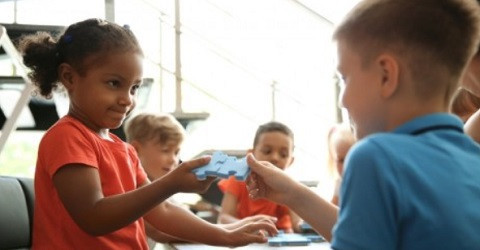A new group made up of UNESCO Member States and focused on exchanging experiences and finding ways to counter hate and discrimination in the post COVID-19 period, has held its first virtual meeting.
The Group of Friends on Solidarity and Inclusion with Global Citizenship Education is a platform open to all UNESCO Member States to exchange views and experiences on how to reinforce international solidarity through the promotion of Global Citizenship Education (GCED) and how to effectively respond to the rise in incidents of hatred, discrimination and stigmatization amplified by the pandemic.
Organized by the Republic of Korea, the launch meeting on Tuesday, 26 May 2020 was opened by H.E. Mr Kim Dong Gi, Permanent Representative of the Republic of Korea with representatives from Armenia, Austria, Bangladesh, Colombia, Italy, Jordan, Kenya, Philippines, Serbia, and Senegal.
In her welcoming remarks UNESCO Director-General Ms Audrey Azoulay spoke of the increased need for solidarity and multilateralism. She said: “This solidarity is necessary to ensure that, for 1.2 billion children and youth in 150 countries, school closures do not affect their fundamental right to education. This is why we launched the Global Education Coalition.
We urgently need to work together. Your political support is key to making our efforts successful – especially when we consider that this crisis, which has revealed the relevance of global citizenship education, is a warning.”
H.E. Mr Kim Dong Gi said: “The Group of Friends is established to consolidate our efforts to uphold UNESCO ideals and values against misunderstanding of others and selfishness in the context of COVID 19. For the successful pursuit of our noble objectives, we need to have knowledge of the highly interconnected world, a sense of belonging to a society and concrete actions for mutual benefits of the global community.”
In a video statement the Minister of Foreign Affairs of Korea, H.E. Ms Kang Kyung-wha, said: “While the virus harms the body, discrimination harms the mind. Just as we need a vaccine to protect against a viral disease, we need education to fight against prejudice and hatred.”
In a joint statement by the Friends they expressed their commitment to serve as a platform for solidarity and meet the challenges of COVID-19 and beyond.
“GCED has been instrumental in enabling people, young and old to develop empathy, solidarity and respect for others regardless of their race, nationality, ethnicity, gender or religion. We hope to help strengthen social trust through the transformative power of GCED. We invite everyone to join in our voice.”
Expert presentations were given by Ms Vibeke Jensen, Director of the Division for Peace and Sustainable Development, UNESCO on Preparation for the Post-Pandemic period; by Mr Rilli Lappalanien, Director of Finnish Development NGOs on the Impact of COVID-19 Pandemic on Global Solidarity and by Mr Lim Hyunmook, Director of Asia-Pacific Centre of Education for International Understanding (APCEIU) on COVD-19 Pandemic and GCED.
Ms Jensen said: “While our focus is still on the immediate educational needs of countries and their urgent response to ensuring continuity of learning, it is precisely the transformative skills that GCED imparts that will be needed for long-term recovery and the building of more resilient education systems.”
In her closing remarks Ms Stefania Giannini, Assistant Director-General for Education, UNESCO said: “I warmly welcome the establishment of this group and thank the Republic of Korea for this initiative. It is my sincere hope that this will be a group for action and opportunity to champion and accelerate transformative education.
This can happen through advocacy – within your own countries, parliaments and educational constituencies to implement effective GCED policies and actions plans – to translate global commitments into collective and collaborative local action.
It can happen through using the wealth of diverse experience of the group to share, reflect and learn in order to advance the implementation of Target 4.7.”
The group will meet again soon to define their future action plans.


